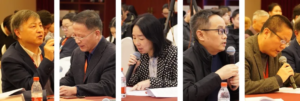China Hangzhou International Intelligence Culture Conference (IICC) is a significant event for the country’s mind sports. It aims to facilitate worldwide exchange and cooperation in mind sports and the research of mind sports culture. IICC has become a global annual event of high prestige in this area, and this year marks the 12th conference. The IICC 2024 spans two days, bringing together 140 experts and amateurs from around the world to share new findings and seek trends in mind sports.

The IICC’s closing ceremony was hosted by Lang Qinfang, Deputy CPC Secretary of the Hangzhou Branch of China Qi-Yuan. The closing ceremony also saw the presence of highly-revered figures such as Wang Guoping, former member of the Standing Committee of the CPC Zhejiang Provincial Committee and Secretary of the CPC Hangzhou Municipal Committee (advisor to the Hangzhou Branch today), Hua Yigang, Honorary Chair of Chinese Weiqi Association, Xue Zhong, Deputy Secretary-General of World Xiangqi Federation and Secretary-General of European Xiangqi Federation, Li Wenlong, IMSA Secretary-General and the Secretary-General of International Mahjong League, Nam Chihyung, President of International Society of Go Studies and a professor of Go Studies at Myongji University, and Hang Tianpeng, CPC Secretary and President of the Hangzhou Branch of Branch of China Qi-Yuan, etc.

Wang Guoping, Hua Yigang, and Xue Zhong each addressed the audience, offering their own thoughts on the future development of mind sports and presenting ideas that leads to the future research in this area.
It was followed by more remarks, each offering takeaways of the thematic forum. It was He Yunbo (Go), Ding Rui (Xiangqi, or Chinese chess), Liang Zhihua (international chess), Sun Dechang (new mind sports), and Hui Yi (chess business) that delivered the remarks as the head of each panel.

New research advances were shared at a special IICC session for paper presentation on December 14 (P.M). The next day featured a forum on chess culture research innovations in the morning, and the IICC closing ceremony in the afternoon at the Music Hall of Mind Building. The 2024 Mind Sports Culture Research Program receives 99 papers, including 21 on new mind sports. Prizes were given as below after the voting of representative paper writers and the review of judge panelists.
The final prize winners include a first prize, a second prize, two third prizes, and ten merit prizes on chess culture, and a first prize, a second prize, and three merit prizes on new mind sports.


Merit Prizes
1.The Relationship between Chess Culture and Social Perceptions in Germany: A Comparative Perspective with China (by Wang Lu, Cheng Xinqian)
2.The Impact of Sports on Urban Development: A Case Study of the Asian Games’ International Chess Events (by Li Kaina, Liang Yaqi)
3.An Examination of the Value and Social Reconfiguration of Digitalized Go in the Metaverse (by Duan Qiang)
4.A Study on the Construction of OMO Go Classes for Primary Schools Facilitated by Virtual Technology (by Liu Jian, Ni Shuwen, Wang Shuai, Tan Juan, Lu Menghan)
5.On the Origins and Verification of the Go Records of “Ten Games at Pinghu Lake ” and a Study on Jin Maozhi, the First Collector of the Four “Ten-Games” Go Records in Ancient China (by Chen Zuyuan)
6.Trends, Issues, and Prospects in the English Translation of Go Terminology (by Ren Chen)
7.How to Make Chinese Chess a Worldwide Game: An Approach Starting with the Simplification of the “Pending Move” (by Xu Yaozong)
8.The Impact and Adjustment of the Rosenthal Effect on the Performance of Young Chess Players (by You Shijie, Yin Hang, Zhang Guohan)
9.On the Innovative Integration of International Chess in Higher Education: A Case Study of Shenzhen MSU-BIT University (by Zhao Xue, Jiang Yijun)
10.Global Perspectives on the Development and Future of University-Centered Chess Programs: A Multidimensional Analysis Based on Innovation, Challenges, and Opportunities (by Hou Yifan, Chen Jinghua)
11.On the Training Model for Mind Sports Insiders through Integration of Job, Class, Competition, and Certification (by Hu Guiying, Wang Yiyi)
12.On “Elegance vs. Popularity” in Guanpai Style and Thoughts on Its Proper and Sustainable Development (by Zhu Jie)
13.On the Mechanism and Pathway for Empowering Scientific Education with Technological Sports in the Context of Building a Global Education Power: A Case Study on Hangzhou (by Hui Yi)
14.Innovative Development of New Mind Sports Programs in Higher Education: Its Driving Factors and Coping Strategies (by Lin Yunzhao)
15.Human Recognition vs. Generative AI: Analysis of Mind Games Gameplays against AI in China and Pakistan (by Danish Ahmed, Sun Dechang)
Second Prize on New Mind Sports
1.An Analysis on the Status Quo of Esports Education and Problem Solutions (by Shu Sijia)
First Prize on New Mind Sports
1.Opportunities and Challenges for “Esports Management” Majors in the Context of Digital Sports (by Kong Zhe, Zhang Mingming, Qiao Xin, Li Mingchen)
Third Prizes on Chess Culture Research
1.On the Popularity and Operational Status of Go Games for Persons with Disabilities in Asia (by Nam Chihyung, Zhou Rui)
2.On the Pathway into the Integration of AIGC and Chess Classes (by Dong Qian)
Second Prize on Chess Culture Research
1.A Brief Account on the Grand Canal Culture and the Development of Chess Games in Cities along the Grand Canal (by Lin Zhenquan, Ding Rui)
First Prize on Chess Culture Research
On the Construction of Go Education Philosophy (by He Yunbo)
Prize Nominees
In addition to prize winners, the rest of papers and research programs submitted to the panel are the Prize Nominees each with a merit certificate.
Prizes for the 8th Mind Sports Culture Debates for University Students
Opening team award: Hangzhou City University
Closing team award: Zhejiang Gongshang University
Best debator: Li Guanjin